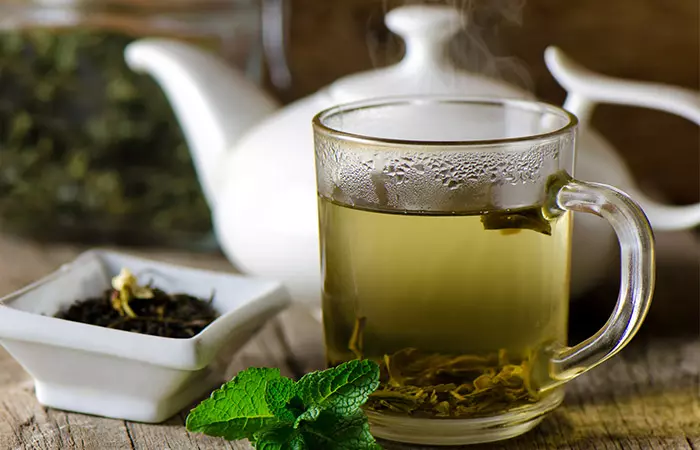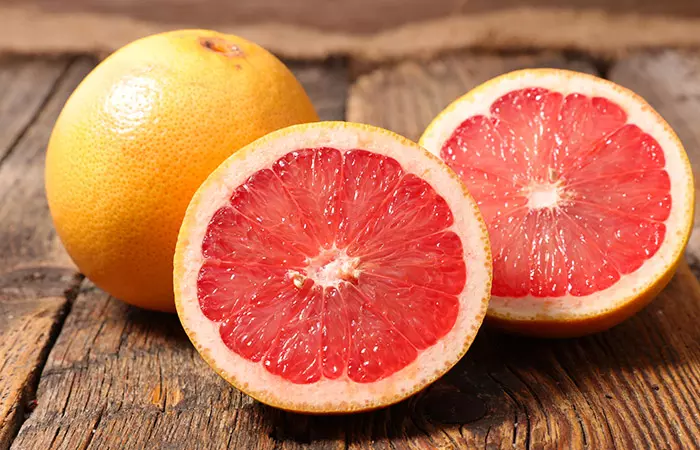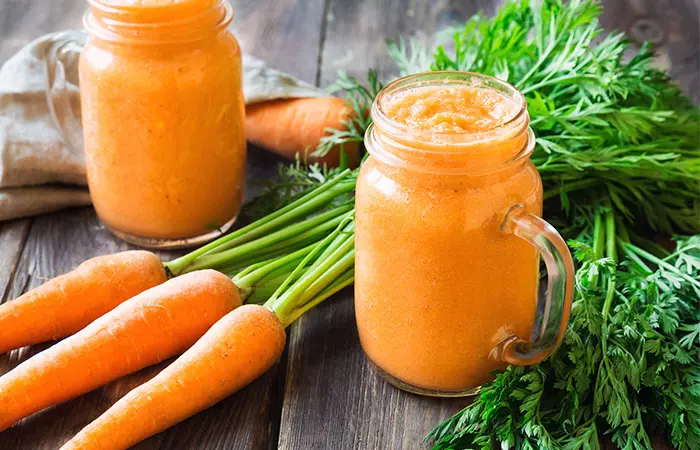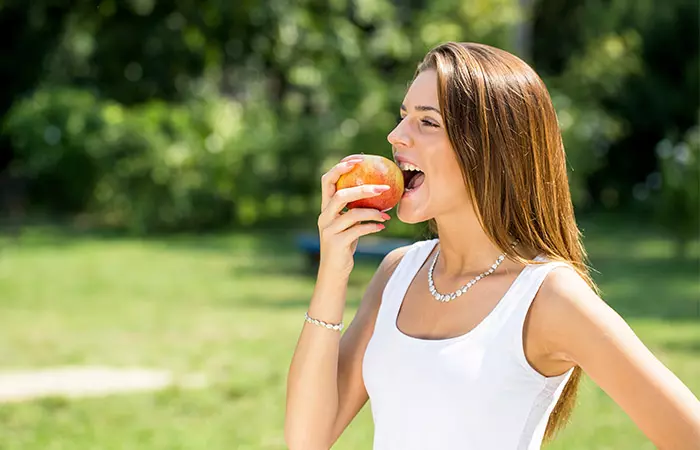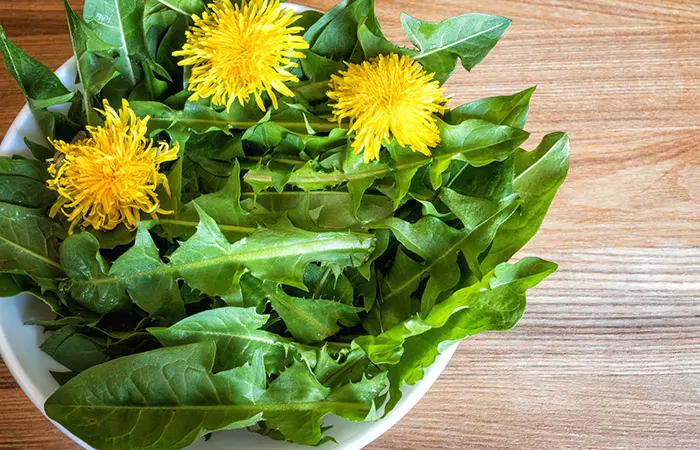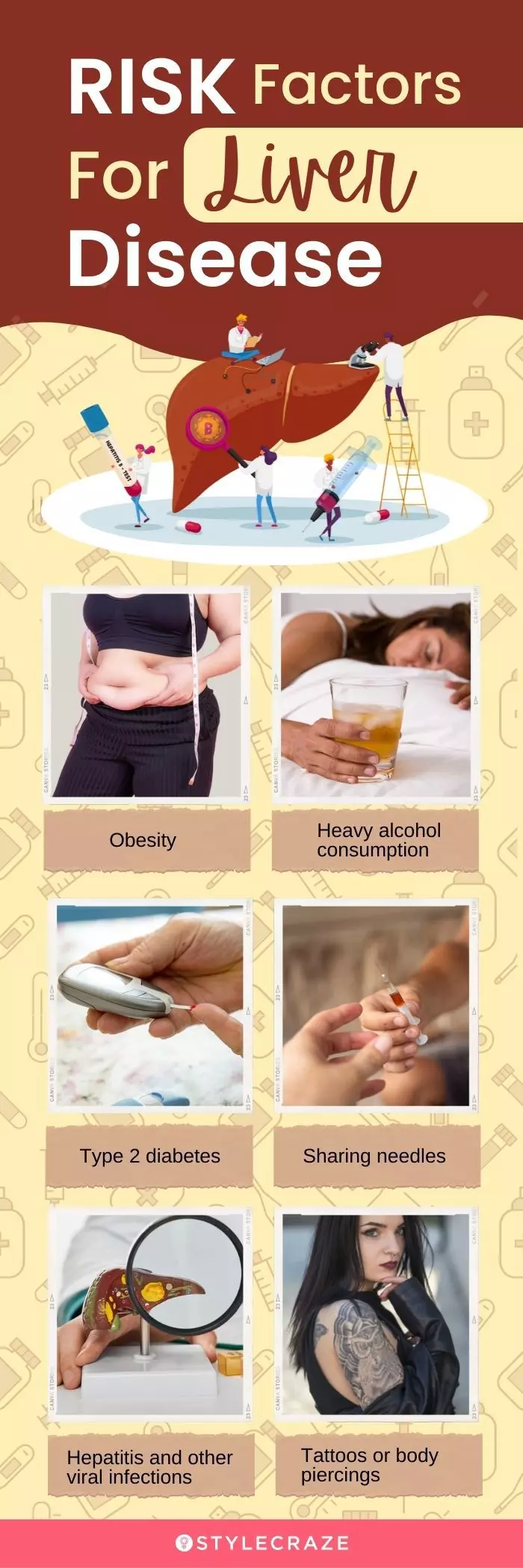23 Best Foods For A Healthy Liver
1. Garlic
Detoxification is important to keep your liver healthy. Garlic is rich in allicin, an antioxidant that protects the body from oxidative damage (3). It also exhibits hepatoprotective (liver protection) effects, which stimulate the liver to activate the enzymes that can flush out harmful substances (4). A study published in Advanced Biomedical Research stated that 400 mg garlic powder could reduce body weight and fat mass among subjects with Nonalcoholic Fatty Liver Disorder (NAFLD) without disturbing lean body mass (5). Following a fatty liver diet is very effective in the long run.
1 clove of raw garlic in the morning every day. 1-2 teaspoons of minced/chopped/pasted garlic in cooked food per day.
2. Green Tea
Green tea is rich in antioxidants and has many health benefits. The main polyphenolsi A family of naturally occurring organic compounds found in many plant-based foods with disease-preventing properties. responsible for all the goodness of green tea are the catechinsi A substance found in tea with antioxidant properties that helps protect cells from damage due to free radicals (unstable atoms). . Chinese scientists confirmed that green tea drinkers showed a significant reduction in the risk of liver cancer, liver disease, liver steatosisi Also known as fatty liver, it is a common condition caused by an increased build-up of excess fat in the liver. , liver cirrhosis, and hepatitis (6). Researchers from Isfahan University of Medical Sciences, Iran, conducted a double-blind, placebo-controlled, randomized clinical trial on nonalcoholic fatty liver patients. They received either green tea extract or green tea extract supplement for 12 weeks. After the 12th week, it was found that green tea extract significantly reduced the liver enzymes associated with nonalcoholic fatty liver disease (7). However, some studies have shown the harmful effects of overconsumption of tea, which may be due to three main factors: (i) its caffeine content, (ii) the presence of aluminum, and (iii) the effects on iron bioavailability. Hence, green tea may not be healthful for all individuals. Talk to your doctor before consuming green tea for improving your liver health (8). 2-3 cups of green tea per day.
3. Coffee
Coffee is one of the most loved beverages. In addition to its stimulating effects, coffee also has a hepatoprotective role (9). A study on middle-aged Japanese men showed that coffee might offer protective effects against liver dysfunction (10). Another study published in the Journal of Hepatology showed an inverse relationship between coffee intake and the incidence of chronic liver disease. Participants who drink 3 cups of coffee per day showed lower rates of disease progression than those who drank less than 1 cup/day (11). 2-3 cups of coffee per day.
4. Turmeric
Curcumin in turmeric is the main bioactive agent that has a hepatoprotective effect. It helps to protect the liver from liver diseases and injury by reducing inflammation, minimizing oxidative stress, and improving lipid metabolism and insulin sensitivity (12), (13). Scientists from the Tel-Aviv Sourasky Medical Center, Israel, conducted an experiment on rats with induced cirrhosis of the liver. They were supplemented with turmeric for 12 weeks. Turmeric’s anti-inflammatory property inhibited the development of liver cirrhosis in rats (14).
1-3 g of turmeric powder/paste per day. 5-3 g of turmeric root per day. 400-600 mg of turmeric supplement, 2-3 per day. Tincture (1:2) – 15-30 drops, 3-4 times per day. Fluid extract (1:1) – 30-90 drops per day.
You can mix it with bulletproof coffee or milk and consume it for better results. Kinley Slayed, a blogger, shares her personal experience with liver pain. Highlighting the reluctance of alcoholics to seek medical help, she stresses the importance of dietary changes for liver health. All of this led her to exploring the benefits of turmeric and other spices, and she encourages incorporating them into daily cooking for liver healing. She adds, “Don’t like the flavor of turmeric? Blend it into smoothies, sneak it into salad dressings, soups and stews. I sprinkle in just about everything now. I like it in my eggs every morning…. You can also find this powerhouse in supplement form (i).”
5. Grapefruit
Grapefruit is a rich source of antioxidants and has been found to boost immunity. Japanese scientists carried out an experiment in which they fed lab rats with grapefruit juice, oroblanco juice, and sugar mix. After one week, the rats were injected with a procarcinogen. The rats that were fed grapefruit juice were found to have a quicker and more active expression of liver enzymes that helped in detoxification (15). ½ -1 grapefruit juice (freshly pressed and no added sugar or artificial sweetener) per day.
6. Beetroot
Beetroot contains antioxidants called betalains that exhibit potent antioxidant and anti-inflammatory effects to reduce oxidative stress (16). A rat study showed that long-term feeding of beetroot juice could help reduce DNA damage and liver injury induced by oxidative stress (17).
1 glass of beetroot juice per day. 1 cup of beetroot, 2-3 times a week.
7. Broccoli
Broccoli is an excellent source of isothiocyanates, sulfur-containing compounds, the most notable of which is sulforaphane. The isothiocyanates regulate the expression of genes that are involved in flushing out carcinogensi Substances or agents that promote carcinogenesis (cancer formation) in humans and animals. and improving metabolism. They also have anti-inflammatory properties (18). A study conducted by scientists at the University of Illinois confirmed that consuming broccoli could help reduce the risk of developing nonalcoholic fatty liver (19). Another study conducted by the College of Agriculture, University of Illinois, stated that consuming broccoli could help protect the liver from liver cancer (20). 1 cup, 2-3 times per week.
8. Ginseng
Ginseng is a medicinal herb found in the roots of the plant Panax ginseng (not to be confused with American or Siberian ginseng). It contains compounds known as ginsenosides that are thought to be responsible for its medicinal properties. There are about 40 ginsenosides present in ginseng. It has been found to protect against liver injury, liver toxicity, cirrhosis, and fatty liver (21). 2 cups of ginseng tea per day.
9. Carrot
Carrots can reduce the risk of nonalcoholic fatty liver and liver toxicity. Scientists from the National Institute of Nutrition, Jamia Osmania, Hyderabad, India, conducted a study by supplementing rats with carrot juice for eight weeks. They found that carrot juice significantly reduced the DHA, triglyceride, and MUFA (Mono Unsaturated Fatty Acids) levels in the liver (22).
1 glass of carrot juice every 2 days. 1 cup of cooked carrot every 2-3 days.
10. Leafy Greens
Leafy green veggies can protect your liver from oxidative damage and other diseases. Veggies, such as collard greens, spinach, lettuce, radish greens, mustard greens, sweet potato greens, rocket spinach, etc., contain good amounts of vitamins A, C, and K, calcium, and antioxidants and have anti-inflammatory properties (23). Consuming leafy greens could help protect the liver from developing fatty liver in rat studies (24). 1-2 cups of green leafy veggies per day.
11. Avocado
This buttery and nutty fruit has many health benefits, and protecting the liver is one of them. Avocados are rich in healthy fats that have anti-inflammatory and antioxidant properties. Since the nonalcoholic fatty liver is caused due to bad lifestyle choices, the anti-inflammatory and antioxidant properties of avocado can help in reducing the risk (25). Japanese scientists found that supplementing lab subjects with avocado could suppress liver damage (26). 2-5 slices, 2-3 times per week.
12. Lemon
The hepatoprotective effects of lemon juice are due to its vitamin (especially vitamin C) and mineral content. A mice study published in Biomedical Research states that intake of lemon juice can help reduce alcohol-induced liver injury and decrease the levels of liver enzymes for overall liver protection (27). ½-1 lemon per day.
13. Apple
Scientists studied the effect of dehydrated apple products on liver and serum lipid levels. After three months, it was found that apple products successfully reduced the serum and liver lipid levels (28). Chinese researchers also confirmed that apple polyphenols play a major role in protecting against concanavalin (a lectin from the legume family) induced immunological liver injury in mice (29). 1 apple per day.
14. Olive Oil
The most common liver problem is a nonalcoholic fatty liver disease that stems from unhealthy lifestyle choices. Scientists have found that people who consume olive oil are less prone to liver diseases. Olive oil helps to lower bad cholesterol and serum triglyceride levels and increase insulin sensitivity and lipid oxidation (30). Hence, you can use olive oil in food preparations to keep your liver healthy. 3-5 tablespoons per day or more than 10 g/day (31).
15. Asparagus
Asparagus is an excellent source of vitamins A, C, E, K, folate, choline, and minerals like calcium, magnesium, phosphorus, potassium, and dietary fiber (32). Scientists from Jeju National University, Korea, conducted an experiment and found that the young shoots and leaves of asparagus could help suppress the hepatoma cell growth (cancerous liver cells) and reduce oxidative stress to protect liver cells (33). Talk to your doctor to determine how much asparagus you can consume per week.
16. Walnut
Walnuts are rich in healthy fats that have anti-inflammatory properties. In a study, high-fat diet-induced fatty liver mice were supplemented with walnuts. This nut helped reduce triglyceride levels in the liver, lowered the levels of enzymes involved in liver homeostasis, and suppressed the genes involved in liver inflammation (34). 7 walnuts per day
17. Red Cabbage
Red cabbage in salads can help protect your liver. A study on rats showed that red cabbage extract reduced liver injury due to oxidative stress (35). 1 cup of cabbage once a day, 2-3 times per week.
18. Whole Grains
Whole grains, such as amaranth, rye, barley, brown rice, quinoa, etc., are rich in dietary fiber, which helps to shed fat and reduce cholesterol. This is good news because whole grains can also help protect against nonalcoholic fatty liver disease (36), (37). 2-3 servings of whole grain per day.
19. Tomatoes
The juicy red tomatoes are also good for your liver. They contain a good amount of antioxidants that help reduce liver inflammation and injury and protect against liver cancer. A study on rats showed that tomato extract supplementation could help reduce the risk of liver damage (38).
1 glass of tomato juice per day. 2-3 tomatoes per day.
20. Dandelion
A study published in the Journal of Food and Chemical Toxicology showed that dandelion roots were protective against alcohol-induced liver damage due to their antioxidative property (39). Talk to your doctor to determine the dose of this herbal medicine or eat the greens a couple of times per week.
21. Brussel Sprouts
Brussels sprouts are rich in vitamins A, K, C, and folate and minerals like calcium, phosphorus, magnesium, and potassium (40). Researchers have found that the oral administration of Brussels sprouts can induce the production of phase II metabolizing enzymes and reduce oxidative stress (41). ½-1 cup, 2-3 times per week.
22. Berries
Berries, such as blueberries and cranberries, are potent sources of antioxidants like anthocyanins and flavonoids that are crucial for liver health. They combat oxidative stress, reduce liver inflammation, and aid detoxification. These properties support the liver’s natural filtering and cleansing functions, ensuring optimal liver health. (42) Berries Dosage For A Healthy Liver Approximately 1/2 to 1 cup of fresh or frozen blueberries and cranberries daily.
23. Grapes
Grapes, especially the red and purple varieties, contain antioxidants like resveratrol that combat oxidative stress, safeguarding the liver from damage. They have natural compounds that aid the liver’s detoxification process, eliminating toxins and promoting overall liver function. Grapes contain anti-inflammatory agents that reduce liver inflammation and support its optimal performance (43). Grapes Dosage For a Healthy Liver 1 to 1&½ cup of grapes daily
Other than these foods, fish (a lean protein), legumes (beans, chickpeas, and lentils), sunflower seeds, and low-fat milk also are healthy for the liver. Along with incorporating the best foods for liver health, adopting specific lifestyle habits can further enhance your liver’s overall function. Scroll down to learn more about them.
Lifestyle Tips For Liver Health
Here are a few changes you may incorporate into your daily routine to maintain a healthy liver:
Regular aerobic exercise, such as riding a bike or jogging, improves blood circulation and aids the liver’s ability to filter toxins (44). Chronic stress can impair liver function (45). Therefore, reducing stress through yoga or meditation may be beneficial. Maintaining adequate hydration is also important, as it helps detoxify the liver and prevent liver-related issues (46). Reducing alcohol consumption, maintaining a healthy weight, and avoiding dangerous chemicals all help the liver. Lastly, getting adequate sleep each night helps the liver repair itself and perform at its best.
Classic And Lesser-Known Signs That Your Liver Is Not Functioning Properly
If you identify with any of the symptoms listed below, talk to the doctor to check for other underlying problems:
Inability to lose weight Bloating Dark urine Poor appetite Compromised immunity Constipation Headache Heartburn and acid reflux Depression Anxiety Chronic fatigue Excessive sweating Hypertension Rosacea Bruising Yellow skin and eyes
Is papaya good for the liver? The following infographic provides information about the various factors that can increase the risk of liver disease. Take a look.Illustration: StyleCraze Design Team Sheri Gaw, a Registered Dietitian Nutritionist, says, “Papaya is loaded with antioxidants that have been shown to reduce the risk of cancer and support liver health. Also, from studies, its extract is promising for the treatment of liver cancer among several other types of cancer.” Is Honey good for the liver? Gaw says, “Honey is different from other types of added sugars as it is packed with antioxidants and anti-inflammatory properties. It can suppress inflammatory markers that are associated with liver injury.” How does diet affect liver function? The nutrients that the diet provides for liver regeneration, cleansing, and general health play a critical role in liver function. When processed foods, sugar, and unhealthy fats are consumed in excess, the liver may get damaged and develop diseases like fatty liver disease. However, a balanced diet high in fruits, vegetables, whole grains, and lean proteins improves liver function. What foods are hard on the liver? Fast foods, canned foods, sugary foods, red meat, alcohol, and soda can increase the load on the liver and affect its functioning. Therefore, avoid them. Is drinking water good for your liver? Drinking water can help flush out toxins from the body. Drink more water to keep your liver healthy. Is coconut water good for the liver? Coconut water is a good electrolyte to rehydrate your body. You need to drink more electrolytesi Minerals that carry an electric charge that balances the amount of fluid in the body and can affect body functions. to nourish your body and liver. Are bananas good for your liver? Yes. Yes, bananas are healthy for the liver and may help relieve cirrhosis (chronic liver damage) (47). However, try to limit them to 1-2 per day, as the fructose in them might cause fatty liver problems. How do I know if my liver is detoxing? Liver detoxification is a crucial step in recovery and is characterized by symptoms such as nausea, vomiting, headaches, anxiety, elevated heart rate, excessive sweating, etc. You can go on a detox diet once a week or as recommended by your doctor or dietician. How do you resolve a fatty liver? The most effective remedy for fatty liver disease is lifestyle changes and a healthy diet. Consult a doctor to understand the diet and lifestyle recommendations for your condition and stick to them. You can also try some yoga asanas for a healthy liver. Are eggs good for the liver? Consuming eggs in limited amounts is good for the liver and overall health. However, excessive egg consumption (2-3 per week) may increase the risk of developing non-alcoholic fatty liver diseases (48). The liver plays an important role in cleansing our body, and certain foods may help in its proper function. Watch this video to find out about the top 10 foods that are friendly to the liver
